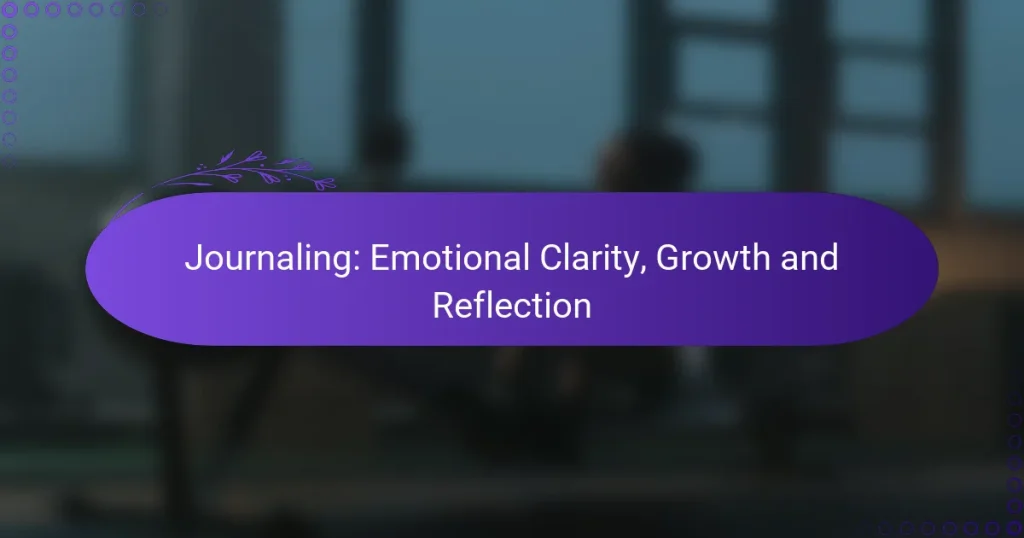Journaling is a powerful tool for achieving emotional clarity, as it allows individuals to express and examine their thoughts and feelings. By engaging in this reflective practice, one can uncover underlying patterns in emotions and behaviors, fostering personal growth and self-awareness. Different journaling styles, such as reflective, gratitude, and goal-setting, each offer unique benefits that contribute to overall development.

How can journaling improve emotional clarity?
Journaling can significantly enhance emotional clarity by allowing individuals to articulate their thoughts and feelings. This practice encourages reflection, helping to identify patterns in emotions and behaviors that may not be immediately apparent.
Enhances self-awareness
Journaling fosters self-awareness by providing a space to explore personal thoughts and feelings without judgment. Regularly writing about experiences can reveal insights into one’s values, motivations, and emotional triggers.
To enhance this self-awareness, consider setting aside time each day to write about your feelings or reactions to specific events. This practice can help you recognize recurring themes in your emotional responses.
Reduces anxiety and stress
Engaging in journaling can effectively reduce anxiety and stress levels by allowing individuals to express their worries on paper. This act of externalizing thoughts can create a sense of relief and clarity.
To maximize stress reduction, try writing down your concerns and then brainstorming potential solutions or coping strategies. This approach can transform overwhelming feelings into manageable steps.
Facilitates emotional processing
Journaling aids in emotional processing by encouraging individuals to confront and work through difficult emotions. Writing about challenging experiences can help clarify feelings and promote healing.
Consider using prompts that focus on specific emotions or events to guide your writing. For example, reflect on a recent conflict and explore your feelings about it, which can lead to greater understanding and resolution.

What types of journaling promote personal growth?
Several types of journaling can significantly enhance personal growth by fostering self-awareness, emotional clarity, and reflection. Reflective, gratitude, and goal-setting journaling each serve unique purposes that contribute to overall development.
Reflective journaling
Reflective journaling involves writing about personal experiences, thoughts, and feelings to gain deeper insights. This practice encourages individuals to analyze their reactions and emotions, helping to identify patterns and triggers.
To start reflective journaling, set aside time daily or weekly to write about significant events or feelings. Focus on what you learned from these experiences and how they shaped your perspective. Avoid judgment; instead, embrace honesty and vulnerability.
Gratitude journaling
Gratitude journaling focuses on recognizing and appreciating the positive aspects of life. By regularly noting things you are thankful for, this practice can shift your mindset from negativity to positivity, enhancing overall well-being.
To implement gratitude journaling, write down three to five things you appreciate each day. These can range from small joys, like a warm cup of coffee, to larger blessings, such as supportive relationships. Consistency is key; aim to make this a daily habit for maximum benefits.
Goal-setting journaling
Goal-setting journaling helps clarify your objectives and track progress toward achieving them. By articulating your goals in writing, you create a roadmap that can guide your actions and decisions.
Begin by outlining short-term and long-term goals, ensuring they are specific, measurable, achievable, relevant, and time-bound (SMART). Regularly review and adjust your goals as needed, and celebrate milestones to maintain motivation. Consider breaking larger goals into smaller, actionable steps to avoid feeling overwhelmed.

How to start a journaling practice in urban environments?
Starting a journaling practice in urban environments involves creating a routine that fits your lifestyle while leveraging the unique aspects of city life. Focus on finding a quiet space and setting aside dedicated time to reflect on your thoughts and experiences.
Choosing the right journaling tools
Selecting the right tools can enhance your journaling experience. Consider whether you prefer digital options, like apps on your smartphone or tablet, or traditional methods, such as notebooks and pens. Each has its advantages; digital tools often offer convenience and portability, while physical journals can provide a tactile experience that many find fulfilling.
When choosing a notebook, look for one that suits your style—whether it’s lined, blank, or dotted. For pens, opt for ones that feel comfortable in your hand and provide smooth writing. A simple checklist for tools might include:
- Notebook (choose size and style)
- Writing instrument (pen or pencil)
- Optional: digital device or app
Finding time in a busy schedule
In urban settings, finding time to journal can be challenging due to hectic lifestyles. Aim to carve out short, consistent periods, such as 10-15 minutes in the morning or evening. This can help you establish a routine without feeling overwhelmed.
Consider integrating journaling into existing habits, like during your commute or while waiting for appointments. Setting reminders on your phone can also help you stay committed. Remember, the key is consistency, so even brief sessions can be valuable for reflection and growth.

What are the benefits of guided journaling?
Guided journaling offers numerous benefits, including enhanced emotional clarity, personal growth, and deeper reflection. By using structured prompts, individuals can explore their thoughts and feelings more effectively, leading to greater self-awareness and insight.
Structured prompts for clarity
Structured prompts are essential in guided journaling as they provide direction and focus. These prompts can help individuals articulate their emotions, identify patterns in their thoughts, and set actionable goals. For example, a prompt might ask, “What made you feel grateful today?” which encourages positive reflection.
Using a variety of prompts can keep the journaling process engaging and insightful. Consider alternating between prompts that focus on emotions, future aspirations, or past experiences. This variation can lead to a more comprehensive understanding of oneself.
Support from journaling apps like Day One
Journaling apps, such as Day One, enhance the guided journaling experience by providing convenient access to prompts and tracking progress. These apps often include features like reminders, multimedia integration, and cloud storage, making it easier to maintain a consistent journaling habit.
When choosing a journaling app, consider features that align with your needs. Look for options that offer customizable prompts, user-friendly interfaces, and the ability to categorize entries. This can help streamline your journaling process and make it more effective.

How does journaling aid in reflection and self-discovery?
Journaling significantly enhances reflection and self-discovery by providing a structured way to articulate thoughts and feelings. This practice allows individuals to explore their emotions, recognize patterns in their behavior, and gain clarity about their personal experiences.
Encourages deeper insights
Journaling fosters deeper insights by encouraging individuals to delve into their thoughts and emotions. By regularly writing about experiences, one can uncover underlying motivations and beliefs that influence behavior. This process often leads to revelations about personal values and priorities.
To maximize insights, consider setting aside time each day to write freely without judgment. Use prompts like “What made me feel fulfilled today?” or “What challenges did I face?” to guide your reflections. Over time, these insights can lead to transformative changes in perspective.
Tracks personal progress over time
Journaling serves as a valuable tool for tracking personal progress, allowing individuals to see how they evolve over time. By reviewing past entries, one can identify growth areas, recognize achievements, and understand recurring challenges. This retrospective view can be motivating and affirming.
To effectively track progress, maintain a consistent journaling schedule, such as weekly or monthly entries. Consider summarizing key themes or milestones at the end of each month. This practice not only highlights progress but also reinforces commitment to personal goals.

What criteria should you consider when choosing a journaling method?
When selecting a journaling method, consider your personal preferences, goals, and the accessibility of materials. The right approach can enhance your emotional clarity, growth, and reflection.
Personal preferences and goals
Your personal preferences play a crucial role in choosing a journaling method. Reflect on whether you prefer writing by hand or typing on a digital device, as each offers different benefits. Handwriting can foster deeper emotional connections, while digital journaling allows for easier editing and organization.
Additionally, define your goals for journaling. Are you seeking emotional clarity, tracking personal growth, or simply reflecting on daily experiences? Your objectives will guide you toward the most suitable method, whether it’s bullet journaling for organization or free writing for self-expression.
Accessibility of materials
Accessibility of materials is essential when choosing a journaling method. Ensure that you have easy access to the tools you need, whether it’s a notebook, pens, or a digital app. If you prefer physical journaling, consider the cost of quality notebooks and writing instruments, which can vary widely.
For digital journaling, explore free or low-cost apps that suit your needs. Many platforms offer templates and prompts to help you get started, making it easier to maintain consistency. Choose a method that fits your lifestyle and budget to encourage regular journaling practice.

How can journaling be integrated into therapy?
Journaling can be effectively integrated into therapy as a method for enhancing self-reflection and emotional processing. It serves as a practical tool for clients to articulate their thoughts and feelings, facilitating deeper insights during therapeutic sessions.
Complementary tool for therapists
Journaling acts as a complementary tool for therapists by providing clients with a safe space to explore their emotions outside of sessions. It encourages regular reflection, which can lead to more productive discussions during therapy. Clients can bring their journal entries to sessions, allowing therapists to better understand their experiences and progress.
Therapists may suggest specific journaling prompts or themes to guide clients in their writing. This can include topics like daily gratitude, emotional triggers, or reflections on therapy sessions, helping to create a structured approach to self-exploration.
Used in cognitive-behavioral therapy
In cognitive-behavioral therapy (CBT), journaling is often used to track thoughts, emotions, and behaviors. Clients can document their experiences, which helps identify patterns and cognitive distortions that contribute to their challenges. This practice reinforces the CBT goal of fostering awareness and promoting healthier thinking.
Common journaling techniques in CBT include thought records, where clients write down negative thoughts and challenge them with evidence. This method not only aids in cognitive restructuring but also empowers clients to take an active role in their mental health journey.


